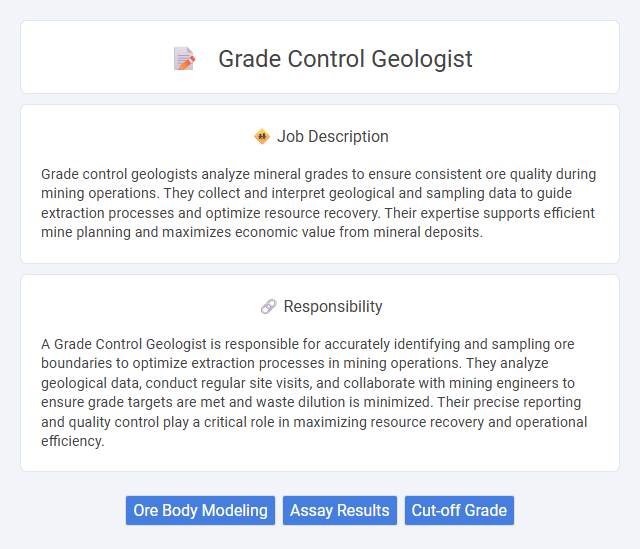
Grade control geologists analyze mineral grades to ensure consistent ore quality during mining operations. They collect and interpret geological and sampling data to guide extraction processes and optimize resource recovery. Their expertise supports efficient mine planning and maximizes economic value from mineral deposits.
Grade control geologists will likely be suited for individuals with strong analytical skills and attention to detail, as the role frequently involves assessing ore quality and directing mining operations. Candidates who are comfortable working in dynamic, sometimes remote environments where quick decision-making under pressure is necessary will probably adapt well to this position. Those who prefer structured office work with minimal field exposure might find the job less compatible with their preferences.
Qualification
A Grade Control Geologist typically requires a Bachelor's degree in Geology, Earth Sciences, or a related field, coupled with experience in mining geology or mineral exploration. Proficiency in geological modeling software, ore reserve estimation, and strong analytical skills are essential for accurate grade control and resource assessment. Knowledge of health and safety regulations, excellent communication skills, and the ability to interpret geospatial data are also critical qualifications for this role.
Responsibility
A Grade Control Geologist is responsible for accurately identifying and sampling ore boundaries to optimize extraction processes in mining operations. They analyze geological data, conduct regular site visits, and collaborate with mining engineers to ensure grade targets are met and waste dilution is minimized. Their precise reporting and quality control play a critical role in maximizing resource recovery and operational efficiency.
Benefit
A Grade Control Geologist likely improves mining efficiency by accurately determining ore boundaries, enhancing resource extraction and reducing waste. This role probably supports cost savings through better material differentiation and quality assurance during mining operations. The position may also increase safety by identifying geological hazards early, helping to minimize operational risks.
Challenge
The role of a grade control geologist likely involves the challenge of accurately interpreting geological data under tight deadlines to ensure mining operations remain efficient and cost-effective. They probably face difficulties in distinguishing ore from waste material in complex geological settings, requiring precise sampling and analysis. Managing variability in ore quality and communicating findings promptly to mining teams might also present ongoing challenges.
Career Advancement
A Grade Control Geologist plays a critical role in mineral exploration by analyzing ore samples and ensuring accurate resource estimation. Mastery in data interpretation, advanced geological software, and fieldwork precision leads to career advancement opportunities such as Senior Geologist, Mine Geologist, or Exploration Manager. Professional development through certifications like SME or EFG and experience with industry-leading technologies accelerates progression within mining companies and consulting firms.
Key Terms
Ore Body Modeling
Grade control geologists specialize in ore body modeling by analyzing drill hole data and sampling results to create detailed 3D models of mineral deposits. These models enable precise identification of ore boundaries, facilitating optimized mining plans and improving resource estimation accuracy. Their expertise supports real-time decision-making to maximize ore recovery and minimize dilution in mining operations.
Assay Results
A grade control geologist meticulously analyzes assay results to ensure accurate ore grade estimations and optimize mining operations. Precise interpretation of assay data guides the delineation of ore boundaries, impacting production efficiency and cost management. Expertise in sampling techniques and statistical validation of assay results is critical for maintaining resource integrity and minimizing dilution.
Cut-off Grade
Grade control geologists play a critical role in determining the cut-off grade, which is the minimum ore grade required for economic mining. They analyze assay data and geological models to establish cut-off grades that optimize mine profitability and resource utilization. Accurate cut-off grade determination ensures effective segregation of ore and waste, improving operational efficiency and cost management.
 kuljobs.com
kuljobs.com